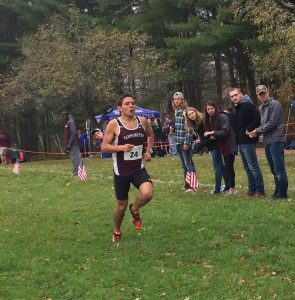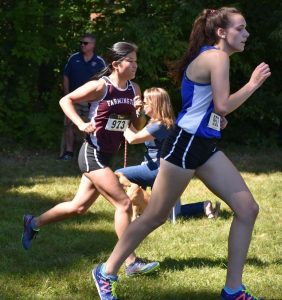
Dec 8, 2017 | Sports |
By Devin Lachappelle – Contributing Writer
Although the Farmington area has yet to see significant snowfall, members of UMF’s Alpine Ski teams are already hitting the slopes and training hard as they look to get a strong start to the season. They hope to eventually make a run for the United States Collegiate Ski & Snowboard Association (USCSA) National Championships in March.
Jed Stevens, a Junior and a captain of the men’s team, is cautiously optimistic about this season. Stevens expects that both the men’s and women’s teams will put up strong performances despite a lack of upperclassmen racers.

Ben Higgins takes a practice run down Chicken Pitch, a steep section of trail at Sugarloaf Mountain
Credit: Ben Higgins
“We have a very young ski team this year,” Stevens said. “Luckily for me, the majority of our team has an ample amount of experience in racing. My expectations for the team this year are high, but skiing is a tough sport, so we take on our season by going one race at a time.”
Jess Freeborn, a sophomore and a captain of the women’s team, agreed with Stevens, and noted that she appreciated her teammates’ energy. “The women’s Alpine team is a young but vibrant team,” she said. “The team [is] extremely excited and eager to hit the snow.”
Although her teammates have shown incredible enthusiasm about this alpine ski season, Freeborn said that she still likes to keep a careful eye on her fellow racers to make sure no one gets overwhelmed.
“I help make sure everyone’s attending practices and in a good place emotionally and academically,” she said. “I have been called the team mom more than a few times!“
Ben Higgins, a recent transfer student from Currie College and a new addition to the men’s Alpine Ski team, was a bit more outspoken about his goals than Stevens and Freeborn were. “We’ve had nationals on our Google Calendar all year,” Higgins said, in reference to the USCSA Championships, which are held in New York at the end of the ski season.
While the Alpine Ski teams don’t have official home racing venues, Stevens mentioned that he and his teammates train often at Titcomb Mountain, a small ski mountain located two miles from the school’s campus.
“UMF and its snow sports teams have an excellent relationship with Titcomb Mountain,” Stevens said. “In my own personal opinion, Titcomb has one of the best trails for slalom races in the state of Maine.”
Stevens also noted that Titcomb is particularly accommodating to UMF students, both for those looking to watch races and those looking to ski. “[Titcomb is] only ten minutes away and provides free skiing to all UMF students, [so] if you want to come watch us compete, this is the venue to do it,” he said.
Stevens and Higgins mentioned that although it isn’t as close to campus as is Titcomb, Sugarloaf Mountain is a fantastic place to practice, given its substantial size and the difficulty of its trails.
“Sugarloaf provides us with an opportunity to train on a large mountain with challenging terrain, which gives us a major edge in races held on difficult slopes,” Stevens said. “Once the season gets into full swing, this is our preferred training space for giant slalom [races].”
Higgins agreed and said, “I would consider Sugarloaf to be part of our extended community here at UMF.” With laughter in his voice, Higgins continued, “It’s not too far away; if you give it a little bit of a lead foot you can get there pretty quickly.”
The full schedules for the men’s and women’s alpine ski teams can be found at http://athletics.umf.maine.edu/sports/malpineski/2017-18/schedule and http://athletics.umf.maine.edu/sports/walpineski/2017-18/roster, respectively.
Any UMF student interested in getting a free season pass to Titcomb Mountain should visit http://www.titcombmountain.com/.

Nov 18, 2017 | Sports |
By Devin Lachapelle – Contributing Writer
Led by three individual top-ten performances for the women and two individual top-ten performances for the men, UMF’s women’s and men’s cross country teams earned second and third place finishes at the North Atlantic Conference Cross Country Championships, which took place in Farmington for the first time in ten years.
UMF’s top female runner was Katie LeBlanc, who placed second out of ninety-five total runners. Teammates Laura Pulito, Gwen Baker, Chloe Kenyon and Molly Jack finished fifth, eighth, twenty-third and twenty-fourth, respectively.
UMF’s best male runner of the day was Jeremiah Sands, who finished second in a field of eighty-five. Robbie Hollis finished in eighth, while David Doering, Cory McCullough, and Connor Marland rounded out the rest of UMF’s scoring positions at eighteenth, thirtieth and thirty-third.
The NAC Championships were held on the Mt. Blue High School campus in Farmington, which Hollis, a captain of the men’s team, said was to the advantage of the UMF runners.
“It’s a slow course, considering the hills, and mentally we knew we would have that edge as a team if we trained here,” he said.
Hollis, in his fourth year at UMF, said he was excited that Farmington had the chance to host such a big event. “There’s a set schedule where it’s decided where the North Atlantic Conference meet is held each year,” he said, “and it was good to see that NACs were going to be held here my senior year.”

UMFs Robbie Hollis approaches the finish line as assistant coach Moninda Morube (left) watches.
Photo Courtesy of Devin Lachapelle
Pulito, a captain of the women’s team, agreed with Hollis and said that much of both teams’ conditioning activities involve exercises designed specifically for the trail system at Mt. Blue. “This is our home course, so we train on it all season and we know it really well,” she said. “We do a lot of hill workouts because there are so many hills on this course.”
Pulito mentioned that preparation for races is not only physical but also mental. “We do a lot of visualization where we sit in a circle and [coach Dan Campbell] brings us through the race,” she said, “and we sit there with our eyes closed and picture the whole thing.”
Moninda Marube, an assistant coach of both the men’s team and the women’s team, said that he was extremely pleased with the tenacity shown by his runners during the race.
“Mentally and emotionally they’re very strong,” he said. “They worked hard; I saw them push, and it really worked out.”
Marube emphasized that his role as a coach was that of a supportive mentor and that the UMF runners deserved most of the credit for the team’s success.
“My purpose is to help them focus and not be nervous,” he said. “They prepared themselves very well. I’m impressed.”
The women’s and men’s teams will both be participating in the NCAA New England Regional Championships in Gorham, Maine later this month.
Full results from the NAC Cross Country Championships and details about the upcoming NCAA Regional meet can be found at http://athletics.umf.maine.edu/sports/wxc/2017-18/schedule for the women and http://athletics.umf.maine.edu/sports/mxc/2017-18/schedule for the men.

Oct 13, 2017 | Feature |
By Devin Lachapelle – Contributing Writer
As the fall semester nears its midpoint, student-athletes at UMF say that they’re able to balance demanding coursework with busy sports schedules thanks to hard work, effective time management and the help of friends and coaches.
Gwen Baker, a junior and member of the women’s cross country team, said that strong time management skills are extremely important for student-athletes given their often-crowded schedules.
“I like to joke that I don’t exist on Tuesdays; I’m busy from 5:30 a.m. to 7:00 p.m., with only a small break in the afternoon,” she said with a laugh. Baker then said, “It’s been a process to learn how to be organized as an athlete. I’ve been very organized because I’ve had to be.”
Michael Pingree, also a junior and a goalkeeper for the men’s soccer team, said that student-athletes often have to make difficult decisions in an effort to not get behind on schoolwork.
“You have to make tough choices and say no,” he said, “whether it be going out of town or going out one night, just because you have a game the next morning.”
Pingree stressed the importance of having a supportive group of friends to help stay motivated. “During the season, you have to have a friend group to keep everything balanced,” Pingree said. “You can really burn yourself out. To have a peer group that you can talk to about it or hang out with really helps.”
Junior and field hockey player Chelsea Ballard mentioned that her game schedule occasionally interferes with her classes. “Sometimes if I have a game on a Tuesday or Thursday night I’ll miss my Social Studies Methods class. We often leave early [for games], so I would miss my Public Writing class as well,” she said.
Ballard went on to describe the steps student-athletes have to take before any planned absences can take place. “Our coach has to sign off on a letter that tells the professor why we’re missing,” Ballard said. “Still, some professors don’t like it when we miss class.”
Ballard, like Baker, credits organization as the key to academic success for students with limited free time. “[Field hockey] takes away from my homework time,” she said. “Being both a student and an athlete, I have learned extremely good time management skills. I’m often going from one thing to another so I have to make sure I have everything organized and set up so I can make the smooth transition.”
Baker, whose athletic schedule also conflicts with her school schedule, stated that while her coaches try to maintain consistent practice times that work for most students, the coaches are flexible and do not penalize players when they do have to miss practice because of classes.

Gwen Baker (Left) competes against an opponent from Saint Josephs College (Right) during the UMF Invitational at Mt Blue High School in early September. (Photo Courtesy of C.J. Jenkins)
“Practice is at 3:45, which is usually a happy medium for everyone. I can’t run until after practice because I have Journalism then,” Baker said. “Coach knows I’ll still do the workout on my own.”
Moninda Marube, an assistant cross country coach at UMF since fall of 2016, agreed that coaches try to adapt to the needs of individual students.
“We work with their professors to ensure that classes do not fall on our training schedule or if they do, we always figure out how a student would best get their workout without missing a class.”
Marube emphasized that the key to academic and sports success was having players trust and support one another. “We have not had cases of students burning out yet,” he said. “We have caring team members who always seek to help each other to stand strong in their weak points.” Marube continued, “We have a great team chemistry and we address each member of our team at a personal level.”
Pingree and Baker both cited physical fatigue as a consistent challenge for student-athletes. Pingree said, “The biggest thing is how tired you are every day. You get home from practice, make dinner, shower, and by that time it’s already 7:00. The physical amount of preparation that goes into [sports] is the hardest thing for people to realize.” Baker said, “I’m usually exhausted coming home from weekend meets.”
Chris Strople, an Assistant Professor of Education at UMF, is the academic advisor to several varsity athletes. Professor Strople noted that student-athletes can be at risk of getting overwhelmed.
“Getting burned out by the high workload is certainly a concern,” he said. “I emphasize the importance of maintaining a balance . . . That balance is not universally achieved and so it often will be different depending on the person.”
Professor Strople, a former Division I water polo player at Loyola Marymount University, noted how important it is for student-athletes to have a support system in place. “I do have first-hand experience with the challenge of balancing the responsibilities of both athletics and academics . . . It’s not easy for anyone with the challenge of finding a balance between the two, so I would encourage them to communicate with their teammates, coaches, classmates, and professors for support when needed,” he said.
Baker, Pingree, Ballard, and Professor Strople all agreed that, despite the challenges faced by student-athletes, the connections made are well worth the effort.
“It’s not always about winning or losing,” said Professor Strople, “but often about the friendships built while working toward a collective goal.”
The women’s cross country team heads to Colby College for a meet on Friday, Oct. 6th at 4:00. A day later, the field hockey team will face off against New England College at 2:00 and the men’s soccer team will battle Green Mountain College at 3:30, both at home.
For more detailed information about the fall sports schedules, including schedules of sports not listed here, visit http://athletics.umf.maine.edu/landing/index.



